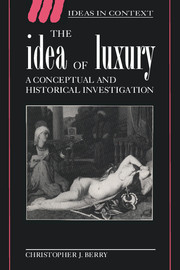5 - The de-moralisation of luxury
Published online by Cambridge University Press: 01 June 2011
Summary
As we have seen, ‘luxury’ was a stock ingredient in the moral vocabulary of the ‘pre-modern’ period. There is a generally accepted story about the characteristic features of the modern world-view and of its emergence from the earlier period. Of course there are many differing strands in this story, each of which is individually open to question and dispute (frequently taking the form of inquiring just how ‘modern’ a particular representative figure like, say, Descartes or Galileo or Grotius ‘really’ is). Even more contentiously, there are differing and competing explanations offered to account for this emergence. The change in esteem enjoyed by luxury can itself be seen as another strand in the general story. I do not wish to tell this story in its entirety but wish instead, and in keeping with the selective approach adopted, to highlight a crucial episode.
The episode covered in this chapter sees the separation of what was contemporaneously called ‘political’ luxury from an overtly moralistic discourse. This non-moral usage is aptly called ‘political’, or sometimes ‘civil’, in so much as it concerns the well-being of the political nation or ‘state’, as it came to be called. The decisive break is not the political focus, for the moralistic language of luxury had always had that focus, but the understanding of this ‘well-being’ in terms of economic prosperity. It is in the context of ‘trade’ that we can discern a significant shift in the meaning of luxury.
- Type
- Chapter
- Information
- The Idea of LuxuryA Conceptual and Historical Investigation, pp. 101 - 125Publisher: Cambridge University PressPrint publication year: 1994

